 W
WAn athlete is a person who competes in one or more sports that involve physical strength, speed or endurance. The use of the term in several sports, such as golf or auto racing, becomes a controversial issue.
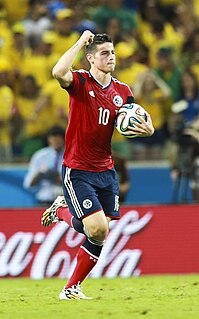 W
WAway colours are a choice of coloured clothing used in team sports. They are required to be worn by one team during a game between teams that would otherwise wear the same colours as each other, or similar colours. This change prevents confusion for officials, players, and spectators. In most sports, it is the visiting or road team that must change – second-choice kits are commonly known as away kits or change kits in English.
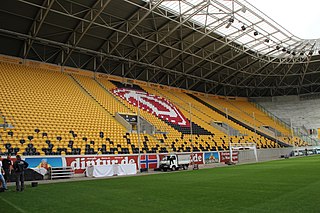 W
WThe term "behind closed doors" is used in several sports, primarily association football, to describe matches played where spectators are not allowed in the stadium to watch. The reasons for this may include punishment for a team found guilty of a certain act in the past, stadium safety issues, public health concerns, or to prevent potentially dangerous clashes between rival supporters. In football it is predicated by articles 7, 12 and 24 of FIFA's disciplinary code.
 W
WA bench-clearing brawl is a form of ritualistic fighting that occurs in sports, most notably baseball and ice hockey, in which every player on both teams leaves their dugouts, bullpens, or benches, and charges the playing area in order to fight one another or try to break up a fight. Penalties for leaving the bench can range from nothing to severe.
 W
WBlondes vs. Brunettes is a powderpuff football game played in cities across the United States. Proceeds from the event are donated to The Alzheimer's Association. Games have been held in more than 40 cities and have cumulatively raised more than $15 Million for the care, support and research efforts of the Association.
 W
WA bronze medal in sports and other similar areas involving competition is a medal made of bronze awarded to the third-place finisher of contests or competitions such as the Olympic Games, Commonwealth Games, etc. The outright winner receives a gold medal and the second place a silver medal. More generally, bronze is traditionally the most common metal used for all types of high-quality medals, including artistic ones. The practice of awarding bronze third place medals began at the 1904 Olympic Games in St. Louis, Missouri, before which only first and second places were awarded.
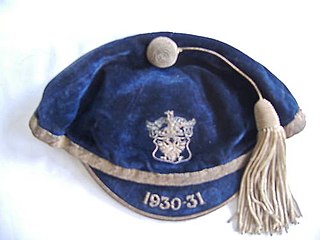 W
WIn sport, a cap is a metaphorical term for a player's appearance in a game at international level. The term dates from the practice in the United Kingdom of awarding a cap to every player in an international match of association football. In the early days of football, the concept of each team wearing a set of matching shirts had not been universally adopted, so each side would distinguish itself from the other by wearing a specific sort of cap.
 W
WCarbohydrate loading, commonly referred to as carb-loading, or carbo-loading, is a strategy used by endurance athletes, such as marathoners and triathletes, to maximize the storage of glycogen in the muscles and liver.
 W
WCard stunts are a planned, coordinated sequence of actions performed by an audience, whose members raise cards that, in the aggregate, create a recognizable image. The images they create can range widely and, through careful planning, the same cards can create a number of different images by systematically changing how the cards are held up. Although card stunts are now performed at a variety of events ranging from sports to political rallies, the card stunt is closely associated with American football, particularly college football, as well as football (soccer) where it can form part of a tifo. The North Korean mass games Arirang Festival, however, were the first to extend the card stunt to an art form, using flip-book cards to produce enormous hour-long animated sequences.
 W
WAn orienteering course is composed of a start point, a series of control points, and a finish point. Controls are marked with a white and orange flag in the terrain, and corresponding purple symbols on an orienteering map. The challenge is to complete the course by visiting all control points in the shortest possible time, aided only by the map and a compass.
 W
WIn sport, a debenture is defined as a certificate of agreement of loans which is given under the company's stamp and carries an undertaking that the debenture holder will get a fixed return and the principal amount whenever the debenture matures. The terms may also include ancillary benefits such as an option to buy tickets at a favourable price, as well as or instead of interest. The term stems from the financial concept of a debenture.
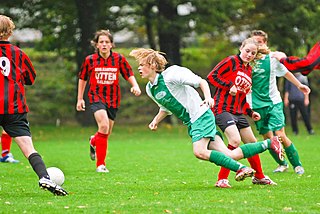 W
WIn sports, a foul is an inappropriate or unfair act by a player as deemed by a referee, usually violating the rules of the sport or game. A foul may be intentional or accidental, and often results in a penalty. Even though it may not be intentional fouling can still cause serious harm or injury to opposing players, or even their own players if unaware of their surroundings during particular situations on sports. Fouls are used in many different sports. Often own teammates can clash and foul each other by accident, such as both going for and with eyes on a ball in AFL. Strategical fouls violate the traditional norms of cooperation and agreement to the essential rules and regulations of the game, or are perhaps not part of the games at all.
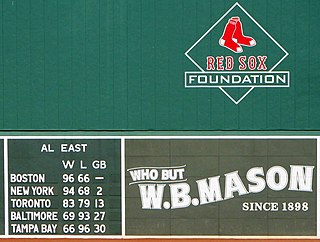 W
WIn most North American sports, the phrase games behind or games back is a common way to reflect the gap between a leading team and another team in a sports league, conference, or division.
 W
WIn many team sports which involve scoring goals, the goalkeeper is a designated player charged with directly preventing the opposing team from scoring by blocking or intercepting opposing shots on goal that kicks the ball from the other player.
 W
WA gold medal is a medal awarded for highest achievement in a non-military field. Its name derives from the use of at least a fraction of gold in form of plating or alloying in its manufacture.
 W
WPrimarily in Australian sports, a grand final is a game that decides a sports league's premiership winning team, i.e. the conclusive game of a finals series. Synonymous with a championship game in North American sports, grand finals have become a significant part of Australian culture. The earliest leagues to feature a grand final were in Australian rules football, followed soon after by rugby league. Currently the largest grand finals are in the Australian Football League (AFL) and National Rugby League (NRL). Their popularity influenced other competitions such as soccer's A-League, the National Basketball League, Suncorp Super Netball and European rugby league's Super League to adopt grand finals as well. Most grand finals involve a prestigious award for the player voted best on field.
 W
WHandicapping, in sport and games, is the practice of assigning advantage through scoring compensation or other advantage given to different contestants to equalize the chances of winning. The word also applies to the various methods by which the advantage is calculated. In principle, a more experienced participant is disadvantaged, or a less experienced or capable participant is advantaged, in order to make it possible for the less experienced participant to win whilst maintaining fairness. Handicapping is used in scoring many games and competitive sports, including go, shogi, chess, croquet, golf, bowling, polo, basketball, and track and field events. Handicap races are common in clubs which encourage all levels of participants, such as swimming or in cycling clubs and sailing clubs, or which allow participants with a variety of standards of equipment. Often races, contests or tournaments where this practice is competitively employed are known as Handicaps.
 W
WIn endurance sports such as cycling and running, hitting the wall or the bonk is a condition of sudden fatigue and loss of energy which is caused by the depletion of glycogen stores in the liver and muscles. Milder instances can be remedied by brief rest and the ingestion of food or drinks containing carbohydrates. The condition can usually be avoided by ensuring that glycogen levels are high when the exercise begins, maintaining glucose levels during exercise by eating or drinking carbohydrate-rich substances, or by reducing exercise intensity.
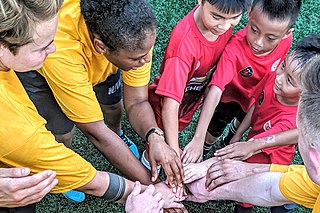 W
WIn sport, a huddle is an action of a team gathering together, usually in a tight circle, to strategize, motivate or celebrate. It is a popular strategy for keeping opponents insulated from sensitive information, and acts as a form of insulation when the level of noise in the venue is such that normal on-field communication is difficult. Commonly the leader of the huddle is the team captain and it is the captain who will try to inspire other team members to achieve success. Similarly after an event a huddle may take place to congratulate one another for the team's success, or to commiserate a defeat. The term "huddle" can be used as a verb as in "huddling up."
 W
WIn sailboat racing, a layline is an imaginary line extending from the objective to indicate the point at which a boat should tack or gybe in order to just clear the mark on the correct side.
 W
WA lucky loser is a sports competitor who loses a match in a knockout tournament or loses in qualifying, but who then enters the main draw, usually when another competitor withdraws during the tournament because of illness, injury, or other reasons. The lucky loser then re-enters the competition, normally in place of the withdrawn competitor.
 W
WMatch penalty is a term used in some sports for a player having committed such a serious offence that he or she is being sent off for the rest of the game. The term is used in bandy, floorball, and ice hockey.
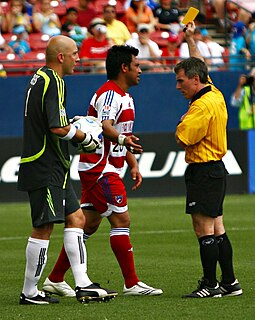 W
WPenalty cards are used in many sports as a means of warning, reprimanding or penalising a player, coach or team official. Penalty cards are most commonly used by referees or umpires to indicate that a player has committed an offence. The official will hold the card above his or her head while looking or pointing towards the player that has committed the offence. This action makes the decision clear to all players, as well as spectators and other officials in a manner that is language-neutral. The colour or shape of the card used by the official indicates the type or seriousness of the offence and the level of punishment that is to be applied. Yellow and red cards are the most common, typically indicating, respectively, cautions and dismissals.
 W
WA pitch or a sports ground is an outdoor playing area for various sports. The term pitch is most commonly used in British English, while the comparable term in American and Canadian English is playing field or sports field.
 W
WIn the United States and Canada, powderpuff football games are flag football or touch football games between girls from junior and senior classes or cross-town school rivals. Funds from the ticket and concession sales for the game typically go to charity, the senior class, or to a dance. The games are an annual tradition at many high schools and universities. The term originates from the powder puff, the soft material used for the application of cosmetic face powder. The games usually occur before homecoming.
 W
WThe press box is a special section of a sports stadium or arena that is set up for the media to report about a given event. It is typically located in the section of the stadium holding the luxury box and can be either enclosed or open to the elements. In general, newspaper writers sit in this box and write about the on-field event as it unfolds. Television and radio announcers broadcast from the press box as well. Finally, in gridiron football, some coaches prefer to work from the press box instead of from the sideline in order to have an "all 22" view of both the offensive and defensive players, along with coaching personnel ordered to by physicians due to medical conditions, or injuries which require rehabilitation and prevent them from being on the sidelines due to risk of further injury. For college and professional basketball, a "press row" along the sideline across the way from the scorer's table is setup instead for broadcasters and statisticians, while most writers work from a traditional press box position.
 W
WIn sports leagues, promotion and relegation is a process where teams are transferred between multiple divisions based on their performance for the completed season. The best-ranked team(s) in the lower division are promoted to the higher division for the next season, and the worst-ranked team(s) in the higher division are relegated to the lower division for the next season. In some leagues, playoffs or qualifying rounds are also used to determine rankings. This process can continue through several levels of divisions, with teams being exchanged between levels 1 and 2, levels 2 and 3, levels 3 and 4, and so on. During the season, teams that are high enough in the league table that they would qualify for promotion are sometimes said to be in the promotion zone, and those at the bottom are in the relegation zone.
 W
W'Rebound' is a term used in sports to describe the ball becoming available for possession by either opponent after an attempt to put the ball or puck into the goal has been unsuccessful. Rebounds are generally considered to be a major part of the game, as they often lead either to a possession change or to a second opportunity to score by the side whose initial attempt failed.
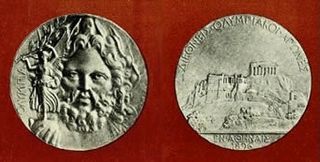 W
WA silver medal in sports and other similar areas involving competition is a medal made of, or plated with, silver awarded to the second-place finisher, or runner-up, of contests or competitions such as the Olympic Games, Commonwealth Games, etc. The outright winner receives a gold medal and the third place a bronze medal. More generally, silver is traditionally a metal sometimes used for all types of high-quality medals, including artistic ones.
 W
WSociedad anónima deportiva is a special type of public limited company in Spain. The new legal status was introduced in 1990 to improve financial management and transparency in sports clubs. Many Spanish football and basketball clubs add the suffix S.A.D. to the end of their official name, e.g. Club Atlético de Madrid, S.A.D.
 W
WSociedade Anónima Desportiva is a special type of public limited company (SA) in Portugal. The new legal status was introduced in the early 1990s to improve financial management and transparency in sports clubs. Many Portuguese football and basketball clubs add the suffix SAD to the end of their official name.
 W
WSporting colours or just colours are awarded to members of a university or school who have excelled in a sport. Many schools do not limit their use to sport but may also give colours for academic excellence or non-sporting extra-curricular activities, Colours are traditionally indicated by the wearing of a special tie or blazer.
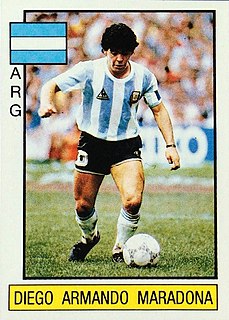 W
WA trading card is a small card, usually made out of paperboard or thick paper, which usually contains an image of a certain person, place or thing and a short description of the picture, along with other text. There is a wide variation of different types of cards. Modern cards even go as far as to include swatches of game-worn memorabilia, autographs, and even DNA hair samples of their subjects.
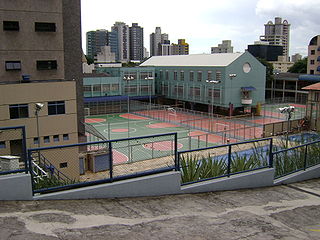 W
WA sports club or sporting club, sometimes athletics club or sports society or sports association, is a group of people formed for the purpose of playing sports.
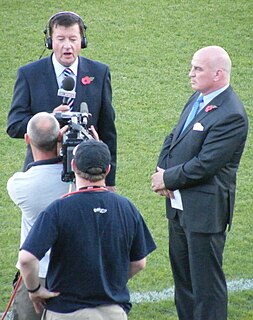 W
WIn sports broadcasting, a sports commentator gives a running commentary of a game or event in real time, usually during a live broadcast, traditionally delivered in the historical present tense. Radio was the first medium for sports broadcasts, and radio commentators must describe all aspects of the action to listeners who cannot see it for themselves. In the case of televised sports coverage, commentators are usually presented as a voiceover, with images of the contest shown on viewers' screens and sounds of the action and spectators heard in the background. Television commentators are rarely shown on screen during an event, though some networks choose to feature their announcers on camera either before or after the contest or briefly during breaks in the action.
 W
WA fan or fanatic, sometimes also termed an aficionado or enthusiast, is a person who exhibits strong interest or admiration for something or somebody, such as a celebrity or a sport or a sports team, a genre, a politician, a book, a movie or an entertainer. Collectively, the fans of a particular object or person constitute its fanbase or fandom. They may show their enthusiasm in a variety of ways, such as by promoting the object of their interest, being members of a related fan club, holding or participating in fan conventions or writing fan mail. They may also engage in creative activities such as creating fanzines, writing fan fiction, making memes or drawing fan art.
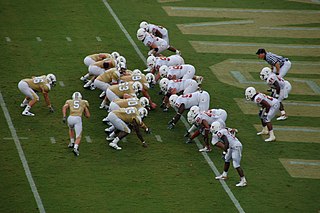 W
WA sports rating system is a system that analyzes the results of sports competitions to provide ratings for each team or player. Common systems include polls of expert voters, crowdsourcing non-expert voters, betting markets, and computer systems. Ratings, or power ratings, are numerical representations of competitive strength, often directly comparable so that the game outcome between any two teams can be predicted. Rankings, or power rankings, can be directly provided, or can be derived by sorting each team's ratings and assigning an ordinal rank to each team, so that the highest rated team earns the #1 rank. Rating systems provide an alternative to traditional sports standings which are based on win-loss-tie ratios.
 W
WA sports team is a group of individuals who play sports, usually team sports, on the same team. Historically, sports teams and the people who play sports have been amateurs. However, by the 20th century, some sports teams and their associated leagues became extremely valuable with net worth in the millions. The Dallas Cowboys are rated by Forbes as the world's most valuable sports team at US$4.2 billion. Some individual sports have modified rules that allow them to be played by teams.
 W
WStandings or rankings are listings which compare sports teams or individuals, institutions, nations, companies, or other entities by ranking them in order of ability or achievement. A table or chart may be employed to display such listings. A league table may list several related statistics, but they are generally sorted by the primary one that determines the rankings. Many industries and institutions may compete in league tables in order to help bring in new customers and clients. Those tables ranking sports teams are generally used to help determine who may advance to the playoffs or another tournament, who is promoted or relegated, or who gets a higher draft pick.
 W
WA team sport includes any sport where individuals are organized into opposing teams which compete to win. Team members act together towards a shared objective. This can be done in a number of ways such as outscoring the opposing team. Team members set goals, make decisions, communicate, manage conflict, and solve problems in a supportive, trusting atmosphere in order to accomplish their objectives. Examples are basketball, volleyball, rugby, water polo, handball, lacrosse, cricket, baseball, and the various forms of association football and hockey.
 W
WA third jersey, alternate jersey, third kit, third sweater or alternate uniform is a jersey or uniform that a sports team can wear instead of its home outfit or its away outfit during games, often when the colors of two competing teams' other uniforms are too similar to contrast easily. Alternate jerseys are also a lucrative means for professional sports organizations to generate revenue, by sales to fans. Of North American sports leagues, the NFL generates $1.2 billion annually in jersey sales, with the NBA second selling $900 million annually. Another use of the alternate uniform is for identifying with causes, like the Central Coast Mariners wear an alternate pink kit on pink ribbon day.
 W
WThrowback uniforms, throwback jerseys, retro kits or heritage guernseys are sports uniforms styled to resemble the uniforms that a team wore in the past. One-time or limited-time retro uniforms are sometimes produced to be worn by teams in games, on special occasions such as anniversaries of significant events.
 W
WAn underdog is a person or group in a competition, usually in sports and creative works, who is popularly expected to lose. The party, team, or individual expected to win is called the favorite or top dog. In the case where an underdog wins, the outcome is an upset. An "underdog bet" is a bet on the underdog or outsider for which the odds are generally higher.
 W
WA varsity letter is an award earned in the United States for excellence in school activities. A varsity letter signifies that its winner was a qualified varsity team member, awarded after a certain standard was met.
 W
WVert is a term used in extreme sports especially vert skating, vert skateboarding, snowboarding and BMX to denote a competition held on a vert ramp which allows the competitors to fly into the air and land back on the ramp. This time in the air allows the competitor to perform moves which would otherwise be extremely difficult. An example of this would be a flip, or a spin.
 W
WA walkover, also W.O. or w/o is the awarding of a victory to a contestant because there are no other contestants, or because the other contestants have been disqualified, or have forfeited, or have withdrawn from the contest. The term can apply in sport but also to uncontested elections, when it is also referred to as winning "by default". The word is used more generally by extension, particularly in politics, for an election in which the winner is not the only participant but has little or no competition. The narrow and extended meanings of "walkover" as a single word are both found from 1829.
 W
WA world cup is a global sporting competition in which the participant entities – usually international teams or individuals representing their countries – compete for the title of world champion. A world cup is generally considered the premier competition in its sport, with the victor attaining the highest honour in that sport and able to lay claim to the title of their sport's best. However, in some sports the Olympic title carries at least as much prestige.